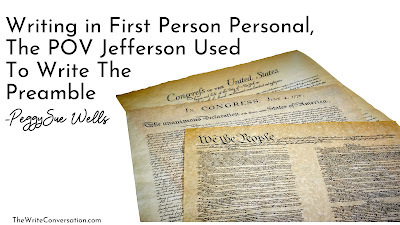Edie Melson's Blog, page 31
December 7, 2024
Learn to Love Accuracy in Writing

by Martin Wiles @LinesFromGod
Ah, those dreaded edits. We who edit love it when we receive those pieces that require little editing—although we do love to play with words and sentence structure. After all, why else would we edit, other than to help writers improve their crafts—and make a few dollars along the way?
Many of us who edit also write, and I dare say we don’t enjoy the editing part of our writing process. Deep inside, we know our babies have imperfections, but the editing process delivers pain—as does the admission that our work needs help.
As a writing teacher, I witness this resistance often. Most students love to write creatively but also relish turning in the paper as soon as they place the final punctuation mark. Big mistake—as I tell them repeatedly. They want to consider their first copy as their final copy. No editing. No erasing. No restructuring sentences for variety. No thinking about a better way to say something.
And what teacher has the time to grade Every Single Assignment their one hundred middle school students complete? Impossible. We grade many things on completion, not accuracy. However, our lack of time doesn’t remove the critical nature of the accuracy concept. Eventually, whether students know what they should know shows up on tests and quizzes.
Editing—self and professional—lets us writers know whether we know what we should know and also demonstrates our willingness to improve our craft. After all, accuracy is critical in almost all areas of life.
If my heart doctor is performing a critical heart procedure, I want accuracy—not just to know he attended medical school. Nor do I want a fish sandwich if I order a cheeseburger from my favorite fast-food joint. And when the plumber replaces my water faucets, I want cold water to flow from the cold water side—and to flow, period.
Most importantly, if my eternity is at stake, I want to ensure the way I anticipate getting to heaven will actually take me there. Apollos preached what he knew about Jesus, but he needed a little editing. Priscilla and Aquilla provided this so he could preach the gospel more accurately.
“When Priscilla and Aquila heard him preaching boldly in the synagogue, they took him aside and explained the way of God even more accurately” (Acts 18:26 NLT).
Let’s admit it—our writing will never be perfect. We, or someone else, can always do more editing or show us a different way to say the same thing. Like a mom who cuts the apron strings, at some point, we must say, “I’m finished,” and send it off or post it. But the accuracy is on us and also an editing benefit. Blue eyes in chapter one and green eyes in chapter four won’t do. Nor can characters use items or words not invented in their historical period.
Most students groan and complain when I point out their grammatical inaccuracies, but a few embrace my corrections and suggestions. They want their work to be the best it humanly can be. And we should want no less as writers.
Accuracy matters—in life and our writing. Strive for it. Embrace it—even if the editor, family member, or friend are the ones who point it out. After all, who wants items stolen from their house because the carpenter didn’t shave and measure the outside door where it would close and lock? He was merely satisfied that he had installed it.
TWEETABLELearn to Love Accuracy in #Writing from Martin Wiles (@LinesFromGod) on @EdieMelson (Click to Tweet)
 Martin Wiles lives in Greenwood, SC, and is the founder of Love Lines from God. He is a freelance editor, English teacher, pastor, and author. He serves as Managing Editor for both Christian Devotions and Vinewords.net and is an instructor for the Christian PEN (professional editor’s network). Wiles is a multi-published author. His most recent book, Hurt, Hope and Healing: 52 Devotions That Will Lead to Spiritual Health, is available on Amazon. He and his wife are parents of two and grandparents of seven. He can be contacted at mandmwiles@gmail.com.
Martin Wiles lives in Greenwood, SC, and is the founder of Love Lines from God. He is a freelance editor, English teacher, pastor, and author. He serves as Managing Editor for both Christian Devotions and Vinewords.net and is an instructor for the Christian PEN (professional editor’s network). Wiles is a multi-published author. His most recent book, Hurt, Hope and Healing: 52 Devotions That Will Lead to Spiritual Health, is available on Amazon. He and his wife are parents of two and grandparents of seven. He can be contacted at mandmwiles@gmail.com.
Published on December 07, 2024 22:00
December 6, 2024
Sharing Jesus' Gifts Through Our Writing

by Tim Suddeth @TimSuddeth
What is it about the Christmas season that makes our culture more open to sharing the love and magic of Christ?
I know. I’ve heard a zillion times how our culture has highjacked Christmas. They’ve taken the meaning of Christmas and made it a marketing ploy instead of truly focusing on Christ. You would think Christmas was made to get us to look at the sales in the stores instead of the baby in a manger.
I’ll admit, it’s easy for the true miracle of Christmas to get lost in the hustle and bustle of the season. We may lose sight of the substance of Christmas for the glitter. But it’s there. It might be hidden behind the Grinch and the fourteen-foot Santa Claus. But if you peer into the shadows in the corner, you’ll see a drummer boy and a manger. The True reason for the season still shows through—in the nativities, in the stars on the trees, in the music, and in the gifts from stranger to stranger.
Why is Christmas so important? Not just to the church, or to people who loudly profess their faith, but also to so many people who don’t normally call attention to themselves. Why is it that at Christmas, the charities, and the nonprofits get their biggest number of donations? That in this season we want to help out our neighbors?
Because through many of the trappings, the traditions, and the stories of the Christmas season, we see three of the gifts that Christ gives us—peace despite adversity, hope for a future, and undeserved, redeeming love. And although most of us cannot put our craving for these gifts into words, they can still be found in the center of our hearts.
That is why Christmas is so special. Even to those who have not yet met Christ or professed their faith in Him, they still feel a shadow of what He promises. And even that shadow they share with others they find worth celebrating.
That is why our roles as Christian writers are so important. Our stories illustrate these gifts from God and how they are meant for us. His gifts aren’t for just the worthy, but for everyone. The whosoevers.
And the need for His gifts doesn’t go away when we take our lights down off our trees. Often, it’s after the holidays when the Christmas cheer is needed the most. Our need for His peace, hope, and love lasts the entire year. (Maybe Hallmark has a point with Christmas in July.)
Whether we write for the general or Christian market, we have the opportunity to implant Christ’s gifts in our stories. No matter the genre or platform, our readers and listeners need what only Christ can provide. Even if they haven’t recognized it yet.
One of my desires for my books, which are mysteries for the general market, is that they will show my readers there is hope in this dark world. That although we might only see the chaos, behind the scenes, the Puppeteer is in control.
It’s funny. Even though we lose sight of our Lord, it’s easy to see His greatness. We need only to step outside and look up. Or listen to someone tell how He has impacted their lives—whether they have followed God most of their ninety years or have recently received Him. God is still active in our world and hasn’t closed up shop.
It’s an incredible gift and responsibility that God has given His writers. (That makes four gifts so far.) Through our words and stories, whether written or spoken, He shares His words and gifts with people.
After the holidays, in our lives and stories, let’s not take His light down. Let’s keep it high where everyone can see it.
I want to take this time to wish y’all a very merry and Christ-focused Christmas. And in the comments, I would love for you to leave which tradition is dearest to you this season. And thank you for allowing me another year of sharing my journey with you.
TWEETABLESharing Jesus' Gifts Through Our Writing from @TimSuddeth on @EdieMelson (Click to Tweet)
 Tim Suddeth is a stay-at-home dad and butler for his wonderful, adult son with autism. He has written numerous blogs posts, short stories, and three novels waiting for publication. He is a frequent attendee at writers conferences, including the Blue Ridge Mountain Christian Writers Conference and a member of Word Weavers and ACFW. He lives near Greenville, SC where he shares a house with a bossy Shorky and three too-curious Persians. You can find him on Facebook and Twitter, as well as at www.timingreenville.com and www.openingamystery.com.
Tim Suddeth is a stay-at-home dad and butler for his wonderful, adult son with autism. He has written numerous blogs posts, short stories, and three novels waiting for publication. He is a frequent attendee at writers conferences, including the Blue Ridge Mountain Christian Writers Conference and a member of Word Weavers and ACFW. He lives near Greenville, SC where he shares a house with a bossy Shorky and three too-curious Persians. You can find him on Facebook and Twitter, as well as at www.timingreenville.com and www.openingamystery.com.
Published on December 06, 2024 22:00
December 5, 2024
Writing on Deadline When You Feel Sad

by A.C. Williams @ACW_Author
The Christmas season is upon us with all its tinsel and lights and general chaos. I love Christmas. It’s my favorite time of year. But the pure joy of the season has changed a bit from when I was younger. Sometimes this whole adulting thing really stinks.
It’s a natural part of life that what brought us joy as children will change as we age, and it’s not even bad that it happens. It’s part of growing up, where your perspective matures and your relationships change. But along with that change often comes sadness.
Grief and sorrow hit harder during the holiday season. Sometimes it’s missing a person who isn’t with you anymore. Sometimes it’s memories of how things used to be, how you wish they still were. Sometimes it’s just being around other people who are celebrating when you don’t feel like celebrating.
First of all, please let me say that if you don’t feel like celebrating in this season of your life, don’t fake it. Don’t pretend that you’re okay if you aren’t. True friends won’t expect you to put on an act to make them feel better.
Grief is weird. It rarely does what you think it will do, and it always shows up when you aren’t expecting it. And, honestly, grief rarely looks like debilitating sobs or the dramatic flinging of yourself across a bed to wail in abject sorrow. I mean, if that’s what it looks like for you, that’s fine, I suppose. But in my experience grief looks more like anxiety or insomnia or procrastination or short tempers. Sometimes tears happen but not always. And you never know what will trigger it either. Sometimes it’s the most innocuous things.
Recognizing grief is an essential step in managing it, because we all grieve differently. But let’s stop ignoring the elephant in the room, shall we?
How do you write when you’re grieving? How do you focus your creative brain enough to put words on a page when all you want to do is cry?
Grief is the most upsetting, distracting ball of emotions I’ve ever had to deal with, and I’ve had to learn how to write all over again in this season of my life dealing with it.
As a professional author, you don’t have the luxury of saying you don’t feel like writing. If you are on deadline, you often don’t have the time to take a day off. You have to hit your deadlines. Its not a matter of pride, it’s a matter of practicality. If the people paying you to write can’t count on content from you, they won’t keep asking you to write for them.
So how do you stay on deadline when you can’t focus? How can you hit your word count goals when your emotions are like a flood? How can you get words on the page when all you can feel is feelings?
Here are three things I’ve learned in my personal season of grief that are helping me hit my deadlines consistently.
1. Keep a journal
Whether this is a spare notebook or an intentional journal where you put down your specific thoughts on a topic, give yourself permission to write something no one else will ever see. I like to be efficient in how I write, so writing something that serves no practical purpose in adding to my published works feels counterintuitive. But in my journal, I am free to write what I feel whether it’s true or not, whether it’s encouraging to someone else or not, whether it’s grammatically correct or not. My journal is my safe place to dump my feelings without analyzing them, without worrying that my expression of grief will mislead someone else.
It’s messy. It’s ugly. It’s usually smeared because I can’t get through an entry without crying. And something amazing happens when I’m done: I feel better. I feel calmer. I feel more focused and intentional and able to think about doing something instead of just feeling things.
2. Have multiple projects
This may be a controversial suggestion, but I’m going to make it anyway because it’s helped me. Work on more than one project at one time. Granted, I don’t think it’s a good idea to divide your attention too much, and if you try this and find that it stresses you out more, stop. You need to do what works for you. But I find that having a fiction project and a non-fiction project going at the same time helps keep my brain engaged with writing even when I don’t feel like writing.
When I’m having a particularly emotional day, fiction usually eludes me. There’s something about the level of creativity fiction requires from me that makes it a struggle when I’m experiencing stronger than normal sadness. So on very sad days, I focus on my non-fiction. I have been writing daily devotions since 2011, and that’s where I go to keep up my word count when my fiction brain isn’t functioning.
It doesn’t have to be devotions, though. Write a memoir. Write a blog post. Work on your marketing content. Just keep writing so when you’re feeling clearer you can go back to your fiction without any atrophy of your writing muscle.
3. Make intentional space
Finally, I don’t want to tell you to plan to grieve, but—plan to grieve. Expect that you will face sorrow and sadness at some point in your life. If you haven’t gone through a season of struggle that affects your concentration yet, you will. Like I said at the start, it’s a normal part of life. So build in some buffer around your deadlines. This isn’t something you always can control, especially if you are traditionally published, but in those instances, be sure to communicate. Most people will be willing to work with you if you are able to express where you’re at in your journey. Grief will slow you down, even if you are processing in a healthy way. Do yourself a favor and expect it.
All of that to say, be gentle with yourself. Grief is a process, no matter what or who you’ve lost. It’s also normal and natural (and even biblical, my Christian friends).
Value your deadlines and your career as a professional author, but don’t neglect to also value your grief. It’s not fun or easy, but as you learn to manage it in a healthy way, you’ll gain insights you don’t expect. Who knows? Maybe one day later in your life, you’ll find yourself writing a blog post about it in hopes of encouraging others who are walking the same road as you.
Nothing is ever wasted, my friends. Not even grief.
TWEETABLEWriting on Deadline When You Feel Sad from @ACW_Author on @EdieMelson (Click to Tweet)
 A.C. Williams, also known as Amy C. Williams, is a coffee-drinking, sushi-eating, story-telling nerd who loves cats, country living, and all things Japanese. Author of more than 20 books, she keeps her fiction readers laughing with wildly imaginative adventures about samurai superheroes, clumsy church secretaries, and goofy malfunctioning androids; her non-fiction readers just laugh at her and the hysterical life experiences she’s survived. If that’s your cup of tea (or coffee), join the fun at www.amycwilliams.com.
A.C. Williams, also known as Amy C. Williams, is a coffee-drinking, sushi-eating, story-telling nerd who loves cats, country living, and all things Japanese. Author of more than 20 books, she keeps her fiction readers laughing with wildly imaginative adventures about samurai superheroes, clumsy church secretaries, and goofy malfunctioning androids; her non-fiction readers just laugh at her and the hysterical life experiences she’s survived. If that’s your cup of tea (or coffee), join the fun at www.amycwilliams.com.
Published on December 05, 2024 22:00
December 4, 2024
A Writer's Christmas Wishes
Edie here. I have a Christmas wish too. We'd all be so honored if you'd nominate The Write Conversation for the Writer's Digest 2025 Best Writing Websites! All the details are below Lynn's post. THANK YOU!!!!

A Writer's Christmas Wishesby Lynn H. Blackburn @LynnHBlackburn
Ah, December.
That glorious time of year when children try to be on their very best behavior, parents try to find the perfect gift that their child didn’t decide was the perfect gift until December 23rd, and writers wonder how many times they have to tell their significant other that all they really want is three days alone to write.
When it comes to Christmas wishes, my motto is “Go big or don’t bother,” so here are a few things I think most writers would love to find under the tree this year.
1. A notebook that is beautiful AND makes you WANT to write in it. I can’t be the only one with a stash of notebooks that I simply can’t bring myself to sully with ink! #unicornnotebook
2. A writing spot where no one texts, calls, or comes to “check to see if you’re alive” — except for when you *want* them to bring food or coffee. #yesIamalive #noIdonotneedtoseethefunnymemeonyourphone
3. A muse that shows up during daylight hours. Or, really, at any time other than thirty seconds after you go to bed or ten minutes after your available writing time. Mine has been a bit overactive around midnight lately. #dobetter
4. A revision Brownie. No, not that kind of brownie. I’m talking about the mythical kind of Brownies that come in, clean up the mess, and can never be spoken of. Of course, an actual brownie to eat while doing revisions would be great, too. But a revision Brownie? Come on! Why can’t these be real? #revisionsmakemecry
5. A perfect plot twist—the kind that makes readers tell all their friends that they have to read your book. Now. To be clear, we don’t want this plot twist to come to us through any negative real-life experiences. We want to make our characters suffer, but we don’t want to suffer! #toomuchtoask?
6. A first draft that flows without any hiccups. As opposed to the normal kind. You know, the kind that leaves writers curled in the fetal position while questioning all their life choices, crying in the shower, and/or looking up employment opportunities in the Caribbean. #IhearArubaisnice
Okay, so I know that if this is my wish list, I’ll be disappointed on Christmas morning, but it’s fun to dream a little, right?
I’ll leave us with one final, far more realistic Christmas prayer for all of us.
I pray we find pockets of creativity in the chaos of the season—whether it's scribbling a sentence between holiday parties or dreaming up plots while untangling lights. And may the new year bring us stories that fire our imagination, inspiration to fuel our craft, and just enough typos to remind us that perfection is, indeed, overrated.
Grace, peace, and merriest of Christmases to you all!Lynn
TWEETABLEA Writer's Christmas Wishes from @LynnHBlackburn on @EdieMelson (Click to Tweet)
 Lynn H. Blackburn is the award-winning author of Unknown Threat, Malicious Intent, and Under Fire, as well as the Dive Team Investigations series. She loves writing swoon-worthy southern suspense because her childhood fantasy was to become a spy, but her grown-up reality is that she's a huge chicken and would have been caught on her first mission. She prefers to live vicariously through her characters by putting them into terrifying situations while she's sitting at home in her pajamas! She lives in Simpsonville, South Carolina, with her true love, Brian, and their three children. Learn more at www.lynnhblackburn.com.
Lynn H. Blackburn is the award-winning author of Unknown Threat, Malicious Intent, and Under Fire, as well as the Dive Team Investigations series. She loves writing swoon-worthy southern suspense because her childhood fantasy was to become a spy, but her grown-up reality is that she's a huge chicken and would have been caught on her first mission. She prefers to live vicariously through her characters by putting them into terrifying situations while she's sitting at home in her pajamas! She lives in Simpsonville, South Carolina, with her true love, Brian, and their three children. Learn more at www.lynnhblackburn.com.
NOMINATE THE WRITE CONVERSATION!
Here's a link to the page on the Writer's Digest Website, explaining the process:
https://www.writersdigest.com/be-inspired/call-for-27th-annual-101-best-websites-for-writers-nominations?fbclid=IwZXh0bgNhZW0CMTEAAR14DSaKo9gbfZ2miI9oTFKH-e7X8w9-fT2kvpMAj2I8aRKopuZET7gfs-Y_aem_sdTZ4zkPCQQH8L3wnUp2_w
If you want to go directly to the nomination form:
https://docs.google.com/forms/d/e/1FAIpQLSeNSzfth0NdK3Mu38LTtDW4lvAy5QVhByn1NHkJZahtognX8Q/viewform?fbzx=1230564438574371411

A Writer's Christmas Wishesby Lynn H. Blackburn @LynnHBlackburn
Ah, December.
That glorious time of year when children try to be on their very best behavior, parents try to find the perfect gift that their child didn’t decide was the perfect gift until December 23rd, and writers wonder how many times they have to tell their significant other that all they really want is three days alone to write.
When it comes to Christmas wishes, my motto is “Go big or don’t bother,” so here are a few things I think most writers would love to find under the tree this year.
1. A notebook that is beautiful AND makes you WANT to write in it. I can’t be the only one with a stash of notebooks that I simply can’t bring myself to sully with ink! #unicornnotebook
2. A writing spot where no one texts, calls, or comes to “check to see if you’re alive” — except for when you *want* them to bring food or coffee. #yesIamalive #noIdonotneedtoseethefunnymemeonyourphone
3. A muse that shows up during daylight hours. Or, really, at any time other than thirty seconds after you go to bed or ten minutes after your available writing time. Mine has been a bit overactive around midnight lately. #dobetter
4. A revision Brownie. No, not that kind of brownie. I’m talking about the mythical kind of Brownies that come in, clean up the mess, and can never be spoken of. Of course, an actual brownie to eat while doing revisions would be great, too. But a revision Brownie? Come on! Why can’t these be real? #revisionsmakemecry
5. A perfect plot twist—the kind that makes readers tell all their friends that they have to read your book. Now. To be clear, we don’t want this plot twist to come to us through any negative real-life experiences. We want to make our characters suffer, but we don’t want to suffer! #toomuchtoask?
6. A first draft that flows without any hiccups. As opposed to the normal kind. You know, the kind that leaves writers curled in the fetal position while questioning all their life choices, crying in the shower, and/or looking up employment opportunities in the Caribbean. #IhearArubaisnice
Okay, so I know that if this is my wish list, I’ll be disappointed on Christmas morning, but it’s fun to dream a little, right?
I’ll leave us with one final, far more realistic Christmas prayer for all of us.
I pray we find pockets of creativity in the chaos of the season—whether it's scribbling a sentence between holiday parties or dreaming up plots while untangling lights. And may the new year bring us stories that fire our imagination, inspiration to fuel our craft, and just enough typos to remind us that perfection is, indeed, overrated.
Grace, peace, and merriest of Christmases to you all!Lynn
TWEETABLEA Writer's Christmas Wishes from @LynnHBlackburn on @EdieMelson (Click to Tweet)
 Lynn H. Blackburn is the award-winning author of Unknown Threat, Malicious Intent, and Under Fire, as well as the Dive Team Investigations series. She loves writing swoon-worthy southern suspense because her childhood fantasy was to become a spy, but her grown-up reality is that she's a huge chicken and would have been caught on her first mission. She prefers to live vicariously through her characters by putting them into terrifying situations while she's sitting at home in her pajamas! She lives in Simpsonville, South Carolina, with her true love, Brian, and their three children. Learn more at www.lynnhblackburn.com.
Lynn H. Blackburn is the award-winning author of Unknown Threat, Malicious Intent, and Under Fire, as well as the Dive Team Investigations series. She loves writing swoon-worthy southern suspense because her childhood fantasy was to become a spy, but her grown-up reality is that she's a huge chicken and would have been caught on her first mission. She prefers to live vicariously through her characters by putting them into terrifying situations while she's sitting at home in her pajamas! She lives in Simpsonville, South Carolina, with her true love, Brian, and their three children. Learn more at www.lynnhblackburn.com.NOMINATE THE WRITE CONVERSATION!
Here's a link to the page on the Writer's Digest Website, explaining the process:
https://www.writersdigest.com/be-inspired/call-for-27th-annual-101-best-websites-for-writers-nominations?fbclid=IwZXh0bgNhZW0CMTEAAR14DSaKo9gbfZ2miI9oTFKH-e7X8w9-fT2kvpMAj2I8aRKopuZET7gfs-Y_aem_sdTZ4zkPCQQH8L3wnUp2_w
If you want to go directly to the nomination form:
https://docs.google.com/forms/d/e/1FAIpQLSeNSzfth0NdK3Mu38LTtDW4lvAy5QVhByn1NHkJZahtognX8Q/viewform?fbzx=1230564438574371411
Just click on this link to nominate The Write Conversation—and any other sites you love.
No matter whether we make the list or not, I KNOW we have the best community of any blog on the internet!
Thanks & Blessings,Edie & The Write Conversation Team
Published on December 04, 2024 22:00
December 3, 2024
Finding Power When We Find our Point of Difference and Write From There

by Sarah Sally Hamer @SarahSallyHamer
No matter what we write, no matter who we are, there is a point of difference between us and every other writer and, ultimately, between every other person. This is an amazing part of the What is our point of difference? It's what makes us who we are, it's our core, our belief system, the way we express ourselves, and the things we write about. It's the part that makes us real.
It also directly affects what we write and how we do it.
Consider this: Jane Austen wrote stories about the time she lived, when women were very concerned about finding young, wealthy, unmarried men. Especially if a "gentleman's daughter" had no appreciable dowry and no commercial skills to support herself, marriage was almost the only way to support herself. The few other viable choices were to become a governess or the poor sister/aunt who helped support the household by taking on chores which would usually be done by a servant.
Austen's writing reflects that. Yes, she also talks about the human condition in delightful and heartfelt ways—I love the way she clothes the all-too-imperious Mr. Collins in a sense of self-righteous buffoonery. Her doomed love affair with Tom Lefroy may also have had an affect (they not allowed to marry since neither of them had money) on her stories. She certainly was able to create stories that resonate through the years.
Mark Twain also wrote stories about his time and experiences. They are visceral, sometimes ugly, representations of what life was like in the southern United States in the mid-1800s. Even though we now certainly have different sensibilities and ideas about how people should be treated, the way of life in that time period was normal for them. Twain's country "twang" and vivid descriptions are deftly and brilliantly part of both his world and his point of difference, since no one else could tell the stories he told.
What is your point of difference? What aspects of life belong only to you? How can you express them?Be honest, with yourself and others. We each have our story to tell.Don't try to write like someone else or tell the next "Harry Potter story." It's already been told by someone who had her own point of difference. Your story is about you and your life.Be authentic. Some of our stories are about deep, dark wounds of the heart. Telling them, even through a character's eyes, can be painful, dragging up old memories. But, ultimately, they can also be very cathartic and help us to heal.Find your inner boldness and strength. You have both and they need encouragement and support to thrive.Don't let anyone talk you out of your point of difference. It belongs to you and you alone. No matter who tells you differently. Not everyone will like it, or will support you in it, but it's yours to use, abuse, or choose not to use.
Finally, just write. Over and over. Whether what you write is "commercial" or not. Write what you really feel. Allow yourself to find that point of difference, the one that is truly unique to you, and hold on to it with all your fingers and toes. Your words will finally find their voice and, you will be amazed and humbled by how brilliant you really are.
What is your point of difference? What makes you unique?
TWEETABLEFinding Power When We Find our Point of Difference and Write From There @SarahSallyHamer on @EdieMelson (Click to Tweet)
 Sarah (Sally) Hamer, B.S., MLA, is a lover of books, a teacher of writers, and a believer in a good story. Most of all, she is eternally fascinated by people and how they 'tick'. She’s passionate about helping people tell their own stories and has won awards at both local and national levels, including two Golden Heart finals.
Sarah (Sally) Hamer, B.S., MLA, is a lover of books, a teacher of writers, and a believer in a good story. Most of all, she is eternally fascinated by people and how they 'tick'. She’s passionate about helping people tell their own stories and has won awards at both local and national levels, including two Golden Heart finals.A teacher of memoir, beginning and advanced creative fiction writing, and screenwriting at Louisiana State University in Shreveport for over twenty years, she also teaches online for Margie Lawson at www.margielawson.com and for the No Stress Writing Academy at https://www.worldanvil.com/w/classes-.... Sally is a free-lance editor and book coach, with many of her students and clients becoming successful, award-winning authors.
You can find her at info@mindpotential.org
Published on December 03, 2024 22:00
December 2, 2024
Writing in First Person Personal, The POV Jefferson Used To Write The Preamble

by PeggySue Wells @PeggySueWells
First Person Plural POV is one of four subcategories under the category of First Person POV.
While the pronouns I, me, my, and mine are found in First Person Epistolary, Flashback, and Cinematic, as the name implies First Person Plural shares events from a group of people. First Person Plural uses We and Us, Our and Ourselves.
The Day The World Came To Town
Author Jim Defede wrote a delightful example in his book, The Day The World Came To Town: 9/11 in Gander Newfoundland . The author captured the best of the human spirit displayed when some 7000 people dropped in unannounced—literally—on the island town of Gander. Nearly doubling the population in just hours, the residents responded with hospitality, hope, and friendship.
The book description reads: "When 38 jetliners bound for the United States were forced to land at Gander International Airport in Canada by the closing of U.S. airspace on September 11, the population of this small town on Newfoundland Island swelled from 10,300 to nearly 17,000. The citizens of Gander met the stranded passengers with an overwhelming display of friendship and goodwill.
As the passengers stepped from the airplanes, exhausted, hungry and distraught after being held on board for nearly 24 hours while security checked all of the baggage, they were greeted with a feast prepared by the townspeople. Local bus drivers who had been on strike came off the picket lines to transport the passengers to the various shelters set up in local schools and churches. Linens and toiletries were bought and donated. A middle school provided showers, as well as access to computers, email, and televisions, allowing the passengers to stay in touch with family and follow the news.
Over the course of those four days, many of the passengers developed friendships with Gander residents that they expect to last a lifetime. As a show of thanks, scholarship funds for the children of Gander have been formed and donations have been made to provide new computers for the schools. This book recounts the inspiring story of the residents of Gander, Canada, whose acts of kindness have touched the lives of thousands of people and been an example of humanity and goodwill."
For this example, the author brilliantly shows how the residents pulled together as a common identity, while dipping into the emotions and reactions of the thousands who were suddenly completely out of control of their lives and at the mercy of strangers.
The Preamble
Julie Otsuka's title, Buddha in the Attic is written in First Person Plural.
"Some of us on the boat were from Kyoto and were delicate and fair, and had lived our entire lives in darkened rooms at the back of the house. Some of us were from Nara, and prayed to our ancestors three times a day, and swore we could still hear the temple bells ringing. Some of us were farmers' daughters from Yamaguchi with thick wrists and broad shoulders who had never gone to bed after nine."
Instead of one person plural as in the case of multi-personality disorder, or same person plural which would indicate cloning, First Person Plural POV is a group of people engaged together in an activity or task.
While the individuals are not all the same, the group of people act as one as the citizens of Gander chose to respond with grace and kindness to the many anxious and confused travelers who had no where else to go.
First Person Plural POV describes unity, but not necessarily uniformity. The pronoun We in this viewpoint can share an identity or choose to share an identity.
Bridging together as We, First Person Plural POV can describe a group who share an experience.
The Preamble of the Constitution of the United States is penned in First Person Plural POV.
"We the People of the United States, in Order to form a more perfect Union, establish Justice, insure domestic Tranquility, provide for the common defense, promote the general Welfare, and secure the Blessings of Liberty to ourselves and our Posterity, do ordain and establish this Constitution for the United States of America."
First Person Plural POV works well for telling stories from the point of view of a group larger than the typical hero or heroine.
TWEETABLEWriting in First Person Personal, The POV Jefferson Used To Write The Preamble from @PeggySueWells on @EdieMelson (Click to Tweet)
 PeggySue Wells is the bestselling author of 40 books and collaborator of many more. Action and adventure, romantic suspense, military romance, and cozy mystery are the page-turning novels by P.S. Wells, including Homeless for the Holidays, Chasing Sunrise, The Patent, and Unnatural Cause. How to live better, easier, and simpler is the focus of her nonfiction including The Ten Best Decisions A Single Mom Can Make. Founder of SingleMomCircle.com, PeggySue coaches writing and speaks at events and conferences. When not writing, she parasails, skydives, snorkels, scuba dives, rides horses, and has taken (but not passed) pilot training. Connect with her at www.PeggySueWells.com, on Facebook at PeggySue Wells, and LinkedIn at linkedin.com/in/peggysuewells
PeggySue Wells is the bestselling author of 40 books and collaborator of many more. Action and adventure, romantic suspense, military romance, and cozy mystery are the page-turning novels by P.S. Wells, including Homeless for the Holidays, Chasing Sunrise, The Patent, and Unnatural Cause. How to live better, easier, and simpler is the focus of her nonfiction including The Ten Best Decisions A Single Mom Can Make. Founder of SingleMomCircle.com, PeggySue coaches writing and speaks at events and conferences. When not writing, she parasails, skydives, snorkels, scuba dives, rides horses, and has taken (but not passed) pilot training. Connect with her at www.PeggySueWells.com, on Facebook at PeggySue Wells, and LinkedIn at linkedin.com/in/peggysuewells
Published on December 02, 2024 22:00
December 1, 2024
3 Reasons You Need a Writers Conference for Christmas

by Ginny Cruz, MPA, PT
It’s that time of the year again when loved ones ask, “What do you want for Christmas?” As writers, we often dream of more books, a better computer, or maybe a writing shed in the backyard surrounded by chirping bluebirds, buzzing bees, and the sweet scent of jasmine. But perhaps that’s just me. Those are all great things to want for a Christmas gift. But what do you need?
During my prayers, I asked God, “What do these writers need for Christmas?” He quickly brought the writers conference to mind. And I agree with Him. In order to further His kingdom through your writing, you need to increase your audience, improve your craft, and trust the call He’s placed on your talent. Attending a conference is the fastest way to accomplish all of those challenges.
3 Reasons You Need a Writers’ Conference for Christmas:1. Face-to-face networking. If you dream of getting published—and, honestly, who doesn’t—networking face-to-face is always the best option. You could spend the rest of your days sending cold queries or proposals to agents or publishers you’ve never met, and you might get noticed. But if you meet those same folks in person, they will remember you when your email pops up in their inbox. No amount of technology can replace the effectiveness of face-to-face connection.2. Friends who understand. If you dream of having friends who get you, you need to attend a writers' conference. There you will sip a steaming cup of coffee or speak after a class with another writer who will understand your fears, faults, and quirks. Is there anything writers need more than a friend who empathizes? You'll find those friends at a writers conference.3. Validation. If you need validation that you are a writer, you will benefit from attending a writers conference. Don’t be ashamed to admit, “Yes! I need to know if I’m a real writer.” A conference will offer multiple chances to meet others who feel the same. While I’ve only attended Christian conferences, each one revealed that all writers—even multi-published authors— need regular validation and spiritual encouragement.
So, when Santa’s elves start snooping around looking for hints regarding what you secretly hope to receive for Christmas, be bold and declare, “I want to go to a writers’ conference next year.” And go ahead and give them the names and prices, if necessary. Here are three Christian conferences I can personally vouch for:Blue Ridge Mountains Christian Writers ConferenceBlue Lake Christian Writers ConferenceFlorida Christian Writers Conference
A writers’ conference is the best gift you could give yourself this Christmas. Don’t be shy. Let others know what you want and need in 2025.
What reasons have you given for not requesting the gift of a writers conference?
TWEETABLE3 Reasons You Need a Writers Conference for Christmas - from author Ginny Cruz on @EdieMelson (Click to Tweet)
 Ginny Cruz, MPA, PT is a pediatric physical therapist, early intervention specialist, and award-winning author. Her writing encourages and teaches moms simple and effective ways to help their baby meet developmental milestones. In addition to writing, she enjoys hiking, reading, and camping with her husband. Find out more at ginnycruz.com, Instagram, or Facebook.
Ginny Cruz, MPA, PT is a pediatric physical therapist, early intervention specialist, and award-winning author. Her writing encourages and teaches moms simple and effective ways to help their baby meet developmental milestones. In addition to writing, she enjoys hiking, reading, and camping with her husband. Find out more at ginnycruz.com, Instagram, or Facebook.
Published on December 01, 2024 22:00
November 30, 2024
Even With Your Writing, Nothing Will Be Impossible

by Audrey Frank @AudreyCFrank
For nothing will be impossible with God. Luke 1:37
I have been on a steep unlearning curve since I moved to Italy. I had to unlearn American driving rules to pass the Italian driving exam. I am unlearning English syntax and grammar as I begin writing in Italian. The arrangement of lines on a road and commas on a page are annoyingly essential to getting where I want to go and conveying the meaning I intend.
In Luke 1:37 the Greek phrase πᾶν ῥῆμα (pan rhēma) is combined with a negation and translated as “nothing.” This syntax gives the phrase an emphatic position, making it the primary lesson in the entire discussion. This particular arrangement of words is a call for faith.
Embedded here in The Christmas Discussion is a shining invitation.
You are delightfully invited to believe that nothing is impossible with God.
Sometimes, like Mary, we don’t know what impossible thing is lying dormant in our hearts longing to become possible. Before the angel appeared to her, she was completely unaware of the immeasurable, unimaginable glory her faith would bring to God.
The possibility our Creator God imagines for you and me is impossible. His great mind is inscrutable. After all, He designed the chameleon with his five-digit feet, eyes that move in all directions independently, and skin that changes colors to match its environment! God made the seeds of the earth that carry the miracle of life out of decay. He thought up a little fat worm with a voracious appetite, destined to become a delicate butterfly with powdered, jewel-toned wings. What might that Creator be dreaming up about us? Whatever it is, He will make it possible.
For Mary, He dreamed of a girl who would bear a Messiah who would take away the sins of the world.
Grammar and syntax matter. Indeed, they are critical to our understanding of the primary lesson of the entire Christmas discussion.
Will you have faith in the impossible this Christmas? Let’s believe together.
Lord, I accept Your invitation to believe the impossible this Christmas. Amen.
TWEETABLEEven With Your Writing, Nothing Will Be Impossible - @AudreyCFrank on @EdieMelson (Click to Tweet)
 Audrey Frank is an author, speaker, and storyteller. The stories she shares are brave and true. They give voice to those whose words are silenced by shame, the hard things in life that don’t make sense, and the losses that leave us wondering if we will survive. Audrey and her family have spent over twenty years living and working among different cultures and world views, and she has found that God’s story of redemption spans every geography and culture. He is the God of Instead, giving honor instead of shame, gladness instead of mourning, hope instead of despair. Although she has three different degrees in communication and intercultural studies, Audrey’s greatest credential is that she is known and loved by the One who made her.
Audrey Frank is an author, speaker, and storyteller. The stories she shares are brave and true. They give voice to those whose words are silenced by shame, the hard things in life that don’t make sense, and the losses that leave us wondering if we will survive. Audrey and her family have spent over twenty years living and working among different cultures and world views, and she has found that God’s story of redemption spans every geography and culture. He is the God of Instead, giving honor instead of shame, gladness instead of mourning, hope instead of despair. Although she has three different degrees in communication and intercultural studies, Audrey’s greatest credential is that she is known and loved by the One who made her.Audrey is the author of Covered Glory: The Face of Honor and Shame in the Muslim World (Harvest House Publishers), an outpouring of Audrey’s heart to introduce others to the God of Instead. Shame is not unique to the developing world, the plight of the women behind veils, young girls trafficked across borders; shame is lurking in hearts everywhere. Through powerful stories from women around the world, Covered Glory illuminates the power of the Gospel to remove shame, giving honor instead. Available at favorite booksellers: BARNES & NOBLE, BOOKS A MILLION, AMAZON.
Published on November 30, 2024 22:00
November 29, 2024
Learning to Battle Writing Doubt and Emerge Victorious

by Edie Melson @EdieMelsonIt’s incredibly difficult to follow God’s path without defeating the doubt that has taken up residence in our souls.
Doubt can be crippling to a writer. Like fear, doubt comes bubbling up from deep inside of us. It can handicap us in ways that are obvious and ways that kill us from the inside out.
Writers face two major sources of doubt. The first comes from the voices that live in our heads. They accuse us, holding our less-than-perfect work up to ridicule in our minds and pointing out all the reasons we’ll never be good enough. The second is the voice of the enemy. He also whispers ugly lies that grow into weeds of doubt. If we don’t take care of these vicious plants—ripping them out by the roots—they’ll strangle our creativity and drown out our words. But the enemy is crafty.
Other Important Truths About the Doubt Writers FaceHe uses different voices to speak these lies. Sometimes you’ll hear him in the voice of a well-meaning friend or relative. At other times, his voice will seem to come from a person of influence or from your mind. He’s a master at speaking in first person and imitating my voice.Believers often speak of our personal calling. We long to know that special something that God has for us to accomplish within his kingdom. Sometimes we treat the search for our calling as a quest or even a treasure hunt. But truthfully, our calling is buried deep within us, something we’re born with. It’s not a discovery to be made but a desire and yearning to accept and grow into. God has ordered all our days before we were born. He’s set into motion the events in and around us to shape us into what He has for us. Everything we need has been accounted for and placed within our grasp at the proper time.
When we try to push past His timetable, we can become our own worst enemy. By rushing ahead or trying to work things out on our own, we make a jumbled mess.
I’ve never met a writer whose road to publication was a straight path. All of them tell stories about a much longer journey, often filled with detours and odd twists.
But one thing they all say is that they wouldn’t be where they are today without the experience they gained along the journey.
Here’s my story:
I stared at the letter in my hand, almost unable to comprehend what I read. It was two days before Christmas, 1999. I’d been so sure God had called me to write, specifically to write Bible studies. This particular manuscript had been at the publishers over a year and, until that moment, I’d only received encouragement about the progress toward my first book contract.
Dear Mrs. Melson, We’re sorry but this manuscript doesn’t fitour needs at this time. While it’s a good manuscript, you just don’t have the platform needed.
First came the tears, then anger and frustration. Why had God planted this seed of hope within me only to deny me the opportunity?
Fast forward to Christmas 2007, the first year our family celebrated Christmas apart. Our oldest was serving as an infantry marine in Iraq. To say it was a tough year is almost a laughable understatement, but we made it through. God brought our son home safe.
Then on Veterans Day 2011 my first book debuted—a devotional for military families. The best first book I could have ever had because it was birthed out of the fire of experience. But I had to walk the path to get there.
During those years—that long time which felt more like treading water than moving forward—God was refining my heart and giving me time to learn to write well.
I learned that just because I had a heart to write, and a calling to write, I still had a lot to learn. Raw talent is never enough. Nothing can replace experience.
Take a look around you right now. You’re in a unique place, a place that has a lot to teach you, a place you’ll never be able to return to. Don’t waste the experiences you have access to right now. Go deep and wide as a writer, and no matter what the future brings you’ll have built a boat circumstances can never sink.
TWEETABLELearning to Battle Writing Doubt and Emerge Victorious from author @EdieMelson (Click to Tweet)
 Edie Melson is a woman of faith with ink-stained fingers observing life through the lens of her camera. No matter whether she’s talking to writers, entrepreneurs, or readers, her first advice is always “Find your voice, live your story.” As an author, blogger, and speaker she’s encouraged and challenged audiences across the country and around the world. Her numerous books reflect her passion to help others develop the strength of their God-given gifts and apply them to their lives. Connect with her on her website, through Facebook, Twitter and Instagram.
Edie Melson is a woman of faith with ink-stained fingers observing life through the lens of her camera. No matter whether she’s talking to writers, entrepreneurs, or readers, her first advice is always “Find your voice, live your story.” As an author, blogger, and speaker she’s encouraged and challenged audiences across the country and around the world. Her numerous books reflect her passion to help others develop the strength of their God-given gifts and apply them to their lives. Connect with her on her website, through Facebook, Twitter and Instagram.
Published on November 29, 2024 22:00
November 28, 2024
An Advent Mediation for Writers

by Edie Melson @EdieMelson
We are perched on the precipice of another busy season. Our days will be filled with joy and stress—and for writers—the constant give-and-take of finding time to write. I would love to share with you some of the things God has showed me regarding the four weeks of Advent. I invite you to spend some time each week asking God what He has for you regarding each of these themes.
HopeRejoice in hope, be patient in tribulation, be constant in prayer. Romans 12:12
I’m not a very patient person.
There, I’ve said it. I hate to wait for something—especially if it’s something important to me.
And the world where we live tries to tell us that we don’t need patience. Everywhere we turn we’re promised instant answers, instant success, instant happiness. If we listen to the world, fulfillment comes more from a single, instant choice, than anything else.
Unfortunately, with all these instant answers, come fleeting results. As quickly as something comes, it goes. Happiness is momentary, security doesn’t last, and fame is only available in fifteen-minute increments.
God on the other hand, promises us something different.
He promises us good things when we wait. He understands that lasting results take longer than an instant. He also knows that as we grow and mature, our wants and needs will also grow and mature.
When I first started on my writing journey, my goal was to have a book published. Which book was less important than just the fact of having a book. To me, publishing a book signified a certain prominence.
But through the process of waiting for that first book (13 years of waiting—to be exact) God taught me that it did matter which book I published. He used that time of waiting to refine me and grow me up into the writer who could actually write the book He had for me and write it well.
We think of waiting as this thing we must to do to reach our goals and dreams. Truthfully they're being accomplished AS WE WAIT.
So this week, look at waiting as an opportunity to practice and strengthen your hope.
PeacePeace I leave with you; my peace I give to you. Not as the world gives do I give to you. Let not your hearts be troubled, neither let them be afraid. John 14:27
Everywhere we turn we’re being urged to find balance. In advertising we’re given soothing images of candles, yoga, exercise, places to get away, etc. etc. etc. But I’ve recently begun to ask myself if that is really what living a balanced life is all about. And I’ve come to a startling revelation.
A balanced life doesn’t look like we think it should.
I’ve come to realize that balance isn’t an exterior thing, it’s an interior thing. I don’t care how strict we are about planning, diet, exercise, even environment, times of chaos will erupt. We know this is true by experience, but more importantly by looking at the life Jesus lived.
As we march through the New Testament, we see that he has times when the crowds are pushing in, clamoring for attention. We see times when his followers disappoint him. We even see times when he is faced with unexpected (in a human sense) death.
But we also see a perfect example of living a life of balance. And it has nothing to do with what’s going on around him, much less planning, diet, exercise or environment. It has everything to do with allowing God to direct his steps.
To paraphrase a popular song, sometimes He calms the storms and sometimes He calms His child.
So, as I launch full-force into this Christmas season, I’m going to make some changes. I’m looking to God for balance, not at what’s happening around me. Care to join me?
JoyCount it all joy, my brothers, when you meet trials of various kinds, for you know that the testing of your faith produces steadfastness. And let steadfastness have its full effect, that you may be perfect and complete, lacking in nothing. James 1:2 – 4
Publishing is a tough business.
It’s almost impossible to write anything for public consumption without feeling like you’re throwing your heart into the lion’s den. And I don’t know about you, but I give these negative comments a lot more credibility than the positive ones. The good ones I tend to disregard with the thought that the person commenting was, “just being nice.”
With the mind-set of living on past rejections it’s possible to shrivel up and die, at least as a writer. Feeding ourselves on what’s gone before forces us to a standstill.
And it comes with an entire travel trailer full of baggage.
It’s easy to become overwhelmed with doubt, insecurity and an almost overwhelming urge to give up. Instead, draw a line in the sand. Commit today, RIGHT NOW, to begin to live in the future, on the promises God has given you.
If you’re writing now, you know what I mean. You’ve heard that still, small voice call your name. You’ve gotten that confirmation you’ve asked for. Now it’s time to move forward, believing God truly is big enough to make it happen. He doesn’t call us out, fully formed and ready. He calls us out when we’re weak—ready for Him to equip us. So choose joy—even in the midst of trials—and watch the amazing things God’s about to do!
LoveKnow therefore that the Lord your God is God, the faithful God who keeps covenant and steadfast love with those who love him and keep his commandments, to a thousand generations, Deuteronomy 7:9
God loves us. We carry the label of being loved by God. With that firmly in our minds, we can navigate whatever challenges appear in our writing lives.
We’ve all got them in our lives—people who label us.
Sometimes the labels are good:
“You’re so smart.”“You’re so beautiful.”“You’re so organized…“talented...“spiritual…“blessed.”
These are the labels we like to hear—whether they’re true or not. They have a seductive quality, inviting us to congratulate ourselves on what we’ve accomplished.
Sometimes the labels are bad:
“You’re so selfish.”“You’ll never amount to anything.”“You’re such a liar…“a betrayer…“untalented…“lazy.”
Unlike the positive ones, these labels can devastate us. The echos of these take residence in our souls, providing a haunting refrain as we try to follow God’s path.
We can’t get away from a world that seeks to define us, hanging labels on us for everyone to see. And although we know we shouldn’t, if we’re not careful, we can begin to view ourselves through the filters of others.
But let’s talk about labels from a manufacturing perspective. When goods are manufactured, there are only two sources that have the legal right to label something.
The one who manufactured the goods, and
The one who bought the goods.
That concept holds just as true for us as believers. Only two people have the authority and the right to label us.
The One who created us, andThe One who paid the ultimate price for our freedom.
These two also have labels for us.
“You are precious.”“You are loved.”“You are Mine.”
Today I challenge you to join me as I banish the false labels (and the false labelers) and focus on the only two who have the right to define me. Instead, lean into the love of God and remember He called you as a writer for a purpose—His purpose—and it wasn’t to make you a failure. Remain steadfast and let God’s love carry you through this next year.
For anyone who would like a PDF copy of this Advent Meditation for Writers, I've provided a link here.
TWEETABLEAn Advent Mediation for Writers from @EdieMelson (Click to Tweet)
 Edie Melson is a woman of faith with ink-stained fingers observing life through the lens of her camera. No matter whether she’s talking to writers, entrepreneurs, or readers, her first advice is always “Find your voice, live your story.” As an author, blogger, and speaker she’s encouraged and challenged audiences across the country and around the world. Her numerous books reflect her passion to help others develop the strength of their God-given gifts and apply them to their lives.Connect with her on her website, through Facebook, Twitter and on Instagram.
Edie Melson is a woman of faith with ink-stained fingers observing life through the lens of her camera. No matter whether she’s talking to writers, entrepreneurs, or readers, her first advice is always “Find your voice, live your story.” As an author, blogger, and speaker she’s encouraged and challenged audiences across the country and around the world. Her numerous books reflect her passion to help others develop the strength of their God-given gifts and apply them to their lives.Connect with her on her website, through Facebook, Twitter and on Instagram.
Published on November 28, 2024 22:00



